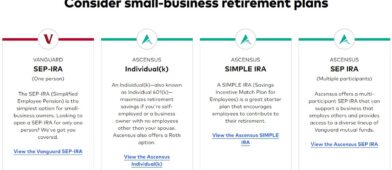When it comes to investing, there are a few names that stick out.
For mutual funds, the giants are Vanguard and Fidelity.
For robo-advisors, we think of Betterment and Wealthfront.
So if you were to pit the best of the pack from each category against one another, a fair representation would be Vanguard vs. Betterment.
Even the most casual fans of personal finance blogs are familiar with Vanguard and Betterment, two of the heaviest hitters in the investing space. Both companies are known for opening up investing to the average person, their low fees, and their wide variety of investment account types.
When you’re choosing an investment platform, you really can’t go wrong with either company. There are tons of gushing reviews for both that attest to this. But nothing in life, no matter how wonderful, is one size fits all and that includes investing platforms.
Some of us love investing, we want to get our hands dirty with a little investing DIY; we want to research mutual funds and ETFs, we want to read annual reports and eagerly await quarterly earnings updates, and know the P/E ratios of dozens of companies off the tops of our heads.
And some of us want to keep our hands clean and leave all of this up to someone (or something) else. We want to answer a few basic questions about risk tolerance and time horizons, set up automatic payments into an investment account and call it a day.
Whichever camp you belong to (I put myself firmly into the second. I have yet to break a nail investing), there is a place for you.
If you prefer to handle your investments, you’ll feel right at home with Vanguard. If you prefer a hands-off approach to your investments then Betterment fits the bill.
Table of Contents
What is Vanguard?

Vanguard was founded in 1975 by John Bogle, a legend in personal finance circles. Bogle saw investors paying high fees for actively managed mutual funds but knew that the vast majority of those funds did not outperform market indexes. Bogle believed in that rather than beating the market, funds should become the market and by doing so Vanguard could offer its customers who are also the company’s owners, low-cost index-based mutual fund investments.
Vanguard offers several kinds of accounts and investment options including Roth and Traditional IRAs, i401(k)s, 529 savings plans, stocks, bonds, mutual funds, and ETFs. Vanguard Personal Advisor charges 0.30% and requires a minimum investment of $50,000.
Some of my favorite mutual funds are Vanguard funds.
What is Betterment?

Betterment has been revolutionary for investors too as one of the first robo-advisors. Betterment uses your investing profile to build a diversified portfolio of exchange-traded funds (ETFs) best suited to meet your financial goals. A computer algorithm builds your portfolio based on the answers you provide when creating your account. Those who invest through Betterment are limited to their recommended portfolios which have been created using Modern Portfolio Theory which focuses on creating diversity within a portfolio through investing in major market sectors instead of individual securities.
Betterment automatically invests your contributions and regularly rebalances your portfolio to keep it aligned with your investing goals. Betterment also offers automatic tax-loss harvesting. Investments that have dropped in value are automatically sold so you can take the deduction off your income taxes. Similar investments are automatically purchased so you don’t miss out when an asset rebounds.
Those who invest through Betterment are limited to their recommended portfolios. The recommendations are made based on the answers you provide when creating your account. Betterment builds your portfolio with a mix of 13 ETFs, six stock ETFs and seven bond ETFs. The percentage is based on your investor profile.
For investors who prefer more control over their portfolios, Flexible Portfolios allows manual adjustments but this is only to those with accounts of at least $100,000.
Betterment offers a variety of accounts including Traditional and Roth IRAs, individual and joint taxable accounts, and trust accounts. Betterment’s basic plan has an annual fee of 0.25% and there is no minimum balance required. The Premium Plan has an annual fee of 0.40% and requires a minimum investment of $100,000 and provides unlimited phone access to financial consultants.
(here is a detailed review of Betterment)
Vanguard Philosophy vs. Betterment Philosophy
When you read a “this versus that” article you expect to read a head to head comparison of two things. Sometimes there is a clear winner and sometimes it’s a photo finish. But Vanguard versus Betterment doesn’t lend itself to that because they are philosophically different.
First of all, as many of you are probably already aware when you invest with Betterment, you’re investing (mostly) with Vanguard. Betterment portfolios are made up of ETFs. Most of them are Vanguard’s low-cost funds. It’s almost like a layer on top of Vanguard (and other low-cost providers).
So the difference comes down to what type of investing platform is better for you – managed by an algorithm or managed by you.
Vanguard allows more flexibility to investors than Betterment in terms of managing your investments. Betterment is better suited to beginning investors and those who want to take a hands-off approach to their investments. Your investments are automated and managed to reduce your taxes too, which is something you’d have to do manually with Vanguard.
What this means is that with Vanguard, you get access to thousands of commission-free ETFs and mutual funds. With Betterment, you only have a dozen or so options. Again, remember they are different services so this is to be expected.
Betterment has been a great tool for those who know that the longer they wait to invest, the more money they’re leaving on the table but don’t yet have (or ever have any interest in developing) a firm grasp on how to become a successful investor. All it takes to become a successful investor with Betterment is to open an account, regularly contribute, and allow the magical combination of compounding interest and time to work their magic.
But beginning investors sometimes catch the bug.
They take an interest in their investments and that interest drives them to better understand investing. That can lead to a more hands-on approach to managing their investments. This is something Betterment doesn’t offer beyond Flexible Portfolios which just lets investors adjust the weights for each of the individual asset classes available in Betterment’s portfolio strategy. And Flexible Portfolios are only available to those with accounts of at least $100,000.
What feels like the flexibility to a hands-off investor might feel like a straight jacket to more sophisticated investors. If that’s the case for you, consider Betterment your investor training wheels. When you’re ready to take the training wheels off, it’s time to make the move to Vanguard. But even if you go on to ride professionally, you’ll always remember your first bike.
Vanguard Fees vs. Betterment Fees
One area we can compare is in the arena of fees.
Betterment charges a 0.25% management fee on top of the fees you pay for the underlying funds. This fee is what helps pay for the technology and algorithms, plus tax loss harvesting which can add to your returns. Betterment does offer a Premium level service with a $100,000 minimum and a 0.40% fee – which gives you unlimited phone access to certified financial planners.
Vanguard has no fees for buying and selling their ETFs but they don’t tax loss harvest for you. You get access to a representative at every level but you only get a financial planner is available to account holders at Vanguard when you have over a million dollars in assets under management.
Vanguard Personal Advisor
When we originally compared the two, Vanguard was a strictly do-it-yourself approach versus Betterment’s robo-advisory service.
Vanguard does offer a similar service in which you can speak with an advisor who can build a portfolio based on your financial needs – it’s called Vanguard Personal Advisor. The difference is that you are given an asset allocation with just Vanguard funds and you pay 0.30% per year for them to help you manage it.
Who Is Better?
If you’ve read this far, you can probably tell that we won’t be giving you an answer. These are different products for different investors.
At this point, you probably know which is the right one for you.
If the answer is Betterment, the best Betterment promotion right now is up to a year of no management fees depending on how much you deposit within 45 days.
Vanguard doesn’t have any promotions, but then again it doesn’t really need them!




Leave a Comment: